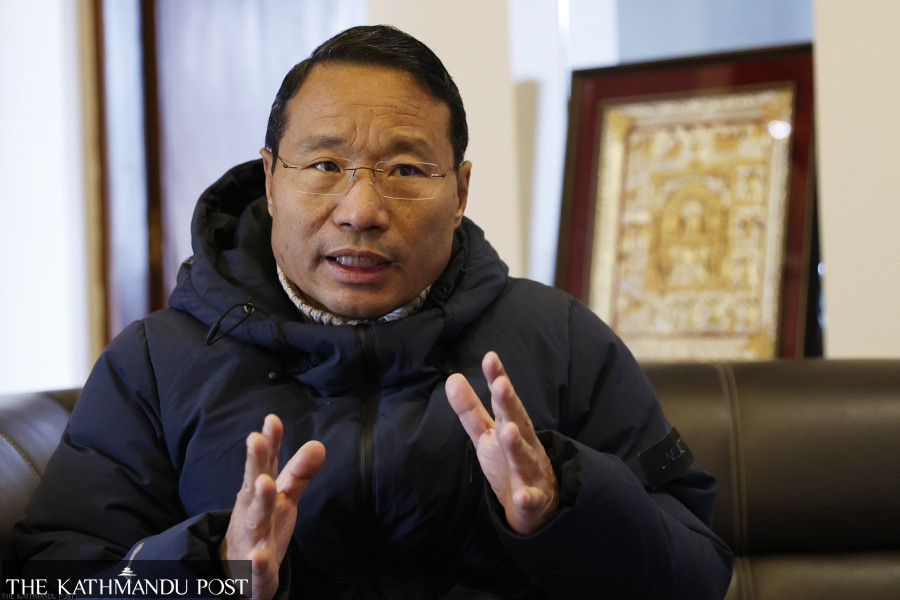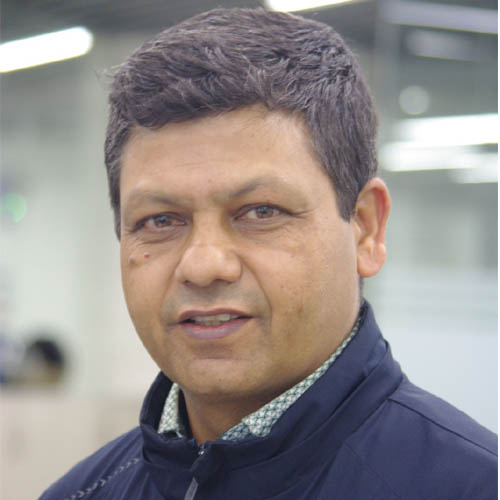Interviews
Major parties shouldn’t forge electoral alliances among themselves
The continuity of the present coalition is necessary to complete the remaining tasks of the peace process and for the effective implementation of the constitution.
Thira Lal Bhusal
The election of one-third of new members in the National Assembly seems to have slightly altered the balance of power in the country. Political forces have intensified negotiations to bag the upper house chair. Likewise, the defeat of a Maoist candidate in the assembly election has sowed a seed of mistrust among the ruling Nepali Congress and CPN (Maoist Centre). The Post’s Thira Lal Bhusal sat down with a Deputy General Secretary of the Maoist Centre, Barshaman Pun, who is also a former finance minister, to make sense of these developments.
You have publicly said that the loss in the National Assembly election of a Maoist Centre candidate from Koshi calls for a review of the overall functioning of the present coalition. Could you elaborate?
Of the 19 candidates jointly fielded by the ruling coalition, 18 won. Intra-party feud in the Nepali Congress was the main reason for our candidate’s defeat. We wouldn’t have taken the incident so seriously were it an isolated case. But two years ago, a coalition candidate lost the assembly election despite the coalition having majority votes. Last year, a group of Congress lawmakers in the same province stood against the Maoist candidate for the chief ministerial post. This time, we lost an upper house seat because of the role played by the Congress faction led by Shekhar Koirala. They have repeatedly betrayed coalition partners. Therefore, we have asked for a serious review of these incidents. We leaders from four coalition parties met and concluded that it was betrayal. We will jointly look into the matter while the Congress will conduct its own intra-party inquiry. We will see how serious they are about addressing the problem.
But what can the Maoist party do even if the Congress doesn’t address the problem. The Maoist Centre, which has just 32 lower house seats, can’t break the partnership with the Congress, can it?
Finding who committed mistakes and taking disciplinary action against them is important in politics. If the Congress corrects its mistakes we can move ahead because we joined hands with the objectives of concluding the remaining tasks of the peace process, implementing the constitution and the federal system and service-delivery to the people through an efficient government. On these fronts, the coalition is working satisfactorily. So we aren’t for an immediate change in government. But we can’t keep on ignoring the mistakes. Those who made such mistakes must be punished.
Are you then considering allying with CPN-UML, for instance?
We haven’t concluded that this coalition can no longer work. Yet there is also a rationale in thinking about alternatives as the country will continue to need leadership even if this coalition fails. But that is the last option.
Any chances of the Maoist Centre-UML coming together in the near future?
In principle, Nepal’s communist parties are close. They can come together at any time. But continuity of the present coalition is necessary to complete the remaining tasks of the peace process, for effective implementation of the constitution, to ensure political stability and to carry out development activities.
Don’t you think the tendency of leaders in Kathmandu to take decisions on behalf of other provinces has caused such problems, which are also against the spirit of federalism?
The provincial committees of the parties should be strong and autonomous. Federalism is strengthened only with the strengthening of provincial bodies. But the issues that cannot be resolved at the provincial level are naturally forwarded to the centre. The same thing happened in the case of Koshi. The centre had to step in only to break the deadlock.
A new power equation has developed in the upper house. Both the Congress and Maoist Centre have presented their claims for the chair of the chamber.
We have emerged as the largest party in the upper house. However, no party commands a majority in the federal parliament. People have given a mixed mandate. So, we have to collaborate with each other. The parties’ presence is somehow reflected in the top five state positions. The President is from the first party, Nepali Congress, the Speaker is from the second-largest party, CPN-UML, the prime minister is from the third-largest, and deputy Speaker is from the fourth-largest. Similarly, the vice president is from a Madhesh-based Janata Samajbadi Party. But as we have agreed to elect the prime minister on a rotation basis, it would be logical for the three main parties [Congress, UML and Maoist Centre] occupy the seats of the President, Speaker and upper house chair respectively.
Therefore, we are claiming the post of Assembly chair. As a leader, Krishna Prasad Sitaula of Congress is a suitable candidate for the upper House chair because of his role in the peace process and in making the constitution. But we also have to reflect people’s mandate in state organs. We still have a couple of weeks before the newly elected members are sworn in. So, it is too early to speak about this matter more specifically.
Prime Minister Pushpa Kamal Dahal and leader of the main opposition KP Sharma Oli met on Friday and reportedly discussed ways to resolve disputes on transitional justice-related law. What is the progress on that?
The Maoists were the more victimised of the two sides in the insurgency. So we are in favour of making the transitional justice laws pro-victims. So far, the major parties have completed peace process-related tasks in consensus. This time around the opposition party, CPN-UML, has differing views on certain issues. But we are trying to resolve them through mutual understanding. But if the deadlock prolongs, we have to find a way out as conflict victims have been languishing for decades. We have also started discussing ways to get the job done through a majority basis in the parliament. We will take the victims, international community and other stakeholders in confidence. In the parliamentary committee where the bill is under discussion, ruling as well as opposition parties have agreed to follow a majority process to end the deadlock, as the last resort.
On Friday, opposition leader Oli said that as there is still a chance of resolving transitional justice issues through consensus, there is no need to push for a majority process. Is the ruling coalition in favour of giving it more time?
No, we shouldn’t prolong it further. We, the warring sides of the conflict period, are now working together. At times, we have jointly run governments, formed electoral alliances and even formed a unified party. But giving justice to the victims is already too late. We need to quickly and properly settle remaining issues to ensure lasting peace.
Let’s move on to party issues. The Maoist Centre is going to hold the party’s policy convention. But such jamborees are always limited to formality. Is the party coming up with anything new from this event?
We have a system of entry into the party, but we don’t have any exit system. So once we have an election system to choose leaders at all levels, it will also work as an exit route. Second, we wanted to involve party representatives from across the country to make our policy making process more participatory.
The Maoist party engaged in such formalities even in the past. But never did it elect leaders through voting.
Our provincial, district and local committees are all electing their leaders. But at the centre, leaders are reluctant to compete against each other. Our party emerged from the people’s war. At the time, all the leaders followed a strict hierarchy. Most central leaders are from that background. But now we have a large number of party members who grew up in an open and competitive environment. So now we will be more competitive.
The Maoist party has gigantic committees. It has vowed to cut their size. But how will you do that?
That’s why we are trying to develop an electoral system. That will help us rightsize the committees. We have around 700 members in the central committee, including alternative members. We will start elections from the central levels. Those who can’t make it to the central bodies will hold positions in the provincial level. Those who can’t secure a position in provincial committees will take responsibility at the local level.
People are asking: Will the Maoist party ever change its chief? You have had the same head for the past 35 years.
A leader should be able to lead the party, give solutions to the problems of the day and answer the questions of the time. Our party chair has proven himself relevant as party chief by doing these key things efficiently for a long time.
For the post of the party general secretary, you and another leader both showed interest in getting elected through voting. But, eventually, the two of you agreed to be deputy general secretaries at the request of the party chief. Why did you run away from the election?
In a political party, one can’t opt for election when a large section of the organisation doesn’t want it. We were ready to compete and accept the result. But later many leaders suggested that there should not be a vote. Now we will make the party more competitive. Also, the party chief has announced to elect leaders through party members’ votes and end the practice of electing leaders through nomination and favours.
In Congress, there is a strong voice against forging an electoral alliance. What is your assessment and what should the Maoist Centre do next time?
We have unique experience of electoral alliances. Our alliance with the CPN-UML was quite successful in terms of vote transfer. We jointly won majority seats. But the alliance couldn’t last despite our resounding majority in the parliament. On the other hand, working in alliance with the Congress to run the government is comfortable. But an electoral alliance with the same party is a failure because we couldn’t transfer Congress votes to other alliance candidates. There are also costs for party organisations. Elections are occasions to expand party activities and organisations. But alliances have a negative impact on the party’s support bases. Therefore, major parties like the Congress, the UML and the Maoist Centre should fight elections on their own. They may join hands with smaller and regional forces but not with each other.




 18.12°C Kathmandu
18.12°C Kathmandu




.jpg&w=200&height=120)







